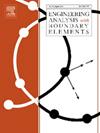FO-PINN:物理信息神经网络的一阶公式
IF 4.2
2区 工程技术
Q1 ENGINEERING, MULTIDISCIPLINARY
Engineering Analysis with Boundary Elements
Pub Date : 2025-02-25
DOI:10.1016/j.enganabound.2025.106161
引用次数: 0
摘要
物理信息神经网络(pinn)是一类深度学习神经网络,它在没有任何模拟数据的情况下学习物理系统的响应,仅通过将控制偏微分方程(PDEs)纳入其损失函数中。虽然pinn可以成功地用于求解正反问题,但对于参数化系统和高阶PDE问题,其精度明显降低。pinn也有边界条件的软实现,导致边界条件没有在边界上的任何地方完全施加。面对这些挑战,我们提出了一阶物理信息神经网络(fo - pinn)。这些pin是用PDE损失函数的一阶公式来训练的。我们表明,与标准pinn相比,fo - pinn在求解参数化系统方面提供了更高的精度,并通过消除计算二阶或高阶导数所需的额外反向传播来减少每次迭代的时间。此外,fo - pin可以使用近似距离函数精确地施加边界条件,这在应用于高阶偏微分方程时提出了挑战。通过四个示例,我们证明了fo - pinn在准确性和训练加速方面优于标准pinn。本文章由计算机程序翻译,如有差异,请以英文原文为准。
FO-PINN: A First-Order formulation for Physics-Informed Neural Networks
Physics-Informed Neural Networks (PINNs) are a class of deep learning neural networks that learn the response of a physical system without any simulation data, and only by incorporating the governing partial differential equations (PDEs) in their loss function. While PINNs are successfully used for solving forward and inverse problems, their accuracy decreases significantly for parameterized systems and higher-order PDE problems. PINNs also have a soft implementation of boundary conditions resulting in boundary conditions not being exactly imposed everywhere on the boundary. With these challenges at hand, we present first-order physics-informed neural networks (FO-PINNs). These are PINNs that are trained using a first-order formulation of the PDE loss function. We show that, compared to standard PINNs, FO-PINNs offer significantly higher accuracy in solving parameterized systems, and reduce time-per-iteration by removing the extra backpropagations needed to compute the second or higher-order derivatives. Additionally, FO-PINNs can enable exact imposition of boundary conditions using approximate distance functions, which pose challenges when applied on high-order PDEs. Through four examples, we demonstrate the advantages of FO-PINNs over standard PINNs in terms of accuracy and training speedup.
求助全文
通过发布文献求助,成功后即可免费获取论文全文。
去求助
来源期刊

Engineering Analysis with Boundary Elements
工程技术-工程:综合
CiteScore
5.50
自引率
18.20%
发文量
368
审稿时长
56 days
期刊介绍:
This journal is specifically dedicated to the dissemination of the latest developments of new engineering analysis techniques using boundary elements and other mesh reduction methods.
Boundary element (BEM) and mesh reduction methods (MRM) are very active areas of research with the techniques being applied to solve increasingly complex problems. The journal stresses the importance of these applications as well as their computational aspects, reliability and robustness.
The main criteria for publication will be the originality of the work being reported, its potential usefulness and applications of the methods to new fields.
In addition to regular issues, the journal publishes a series of special issues dealing with specific areas of current research.
The journal has, for many years, provided a channel of communication between academics and industrial researchers working in mesh reduction methods
Fields Covered:
• Boundary Element Methods (BEM)
• Mesh Reduction Methods (MRM)
• Meshless Methods
• Integral Equations
• Applications of BEM/MRM in Engineering
• Numerical Methods related to BEM/MRM
• Computational Techniques
• Combination of Different Methods
• Advanced Formulations.
 求助内容:
求助内容: 应助结果提醒方式:
应助结果提醒方式:


